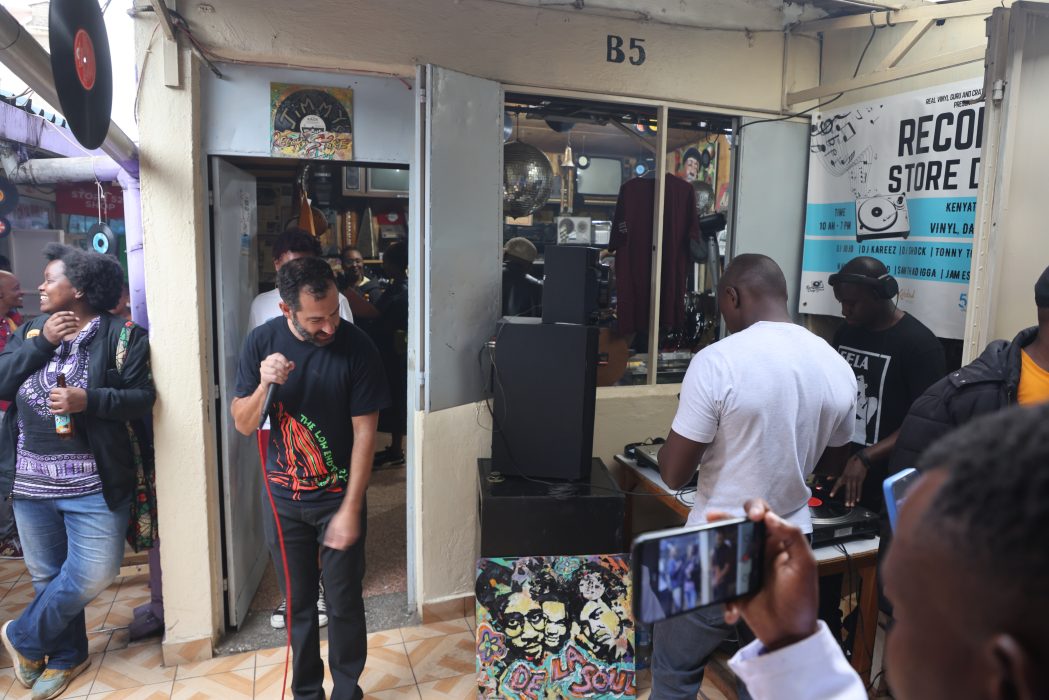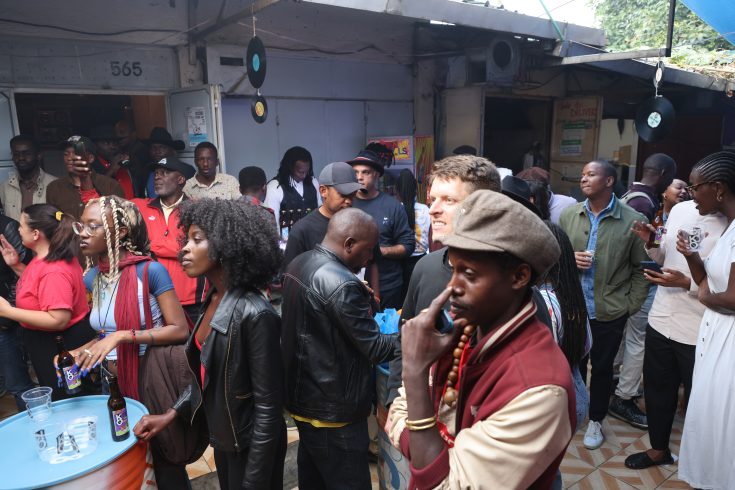It was the fifth year in a row that Jimmy Rugami, Nairobi’s famous record man, was hosting vinyl buffs at his store at Kenyatta Market. It was Record Store Day (RSD), a global event that is the equivalent of Christmas Day for vinyl lovers, celebrated on Saturday 22 April this year.
It was a feast not just of good music, but of the taste buds as well. Music lovers descended at Jimmy’s in droves, drawn from all walks of life and across age and class divides. For the entire afternoon, the smell of grilling nyama choma wafted through the narrow corridors of the market, the air punctuated with fine music from the vinyl set Jimmy had set up, with deejays taking turns to play.
There were fans dancing, freestyling at the mic, and crate-digging inside the shop for records. This while the too-cool-for-school folk stood in twos and threes, taking in the ambiance as they sampled the nyama and sipped drinks, everyone drawn to the place by one thing; their love for vinyl, and like sound junkies trapped in a time warp or an ancient tribe convening at their altar, bobbed their heads and paid homage to the goddess of the records as they journeyed back in time.

The event at Jimmy’s famous shop number 566 was being replicated in similar record stores in cities across the world. The music at Jimmy’s was an eclectic mix of zilizopendwa , modern techno and even goth, each finding favour with a certain matrix of the crowd.
Some of this music had been brought to the event by the performing deejays, who included Djs Jojo, Kareez, Samthadigga, Shock , Tonny Tone and Buddha Blaze among others. But the bulk of the collection was on the shelves in Jimmy’s shop – simply the biggest collection of vinyl in one location in the region. Jimmy owns close to 10,000 records at the store, which has been in operation since 1989.
“Vinyl renaissance is picking up all over the world, that’s why you find so many people here. Last year we had guys from seventeen different countries,” Jimmy told me at the sidelines of the event. “We are hoping to have even more next year, seeing by the rate at which vinyl lovers are coming in. And these are just the people in Nairobi, we haven’t counted the others outside Nairobi who could not come for one reason or another.”
As the revelry was going on, the folks selling nyama choma at adjacent stalls were doing brisk business, orders flying around.
Granted, most of those who turned up are familiar with Jimmy, his regular clients. But then there were the uninitiated who turned up out of curiosity. “Most of these are young people who are reminiscing on what they see their parents do,’’ Jimmy told me. ‘‘This is a trend that is actually picking up.This is the biggest gathering we’ve had since we started marking this day. The crowd is quite amazing. Most of my clients who buy vinyl hate music piracy. That is why they support what we are doing because they play the real thing.”

Jimmy says more young people visited his shop this year, some bringing with them old record players that used to be owned by their parents for repair. “This event means a lot to me. Remember, nobody else does this kind of thing around here,’’ he says. ‘‘Once I bring it to the local crowd and the tourists who come here, I think I am giving everyone a chance of appreciating music.”
Those who patronize Jimmy’s shop are clear on what they are looking for. “Most people here are interested in African music,’’ Jimmy says. ‘‘That’s why we invited benga musician Simon Kihara ‘Musaimo’. Every deejay has his or her taste. When it is your session, you know what genre you want to play. We don’t restrict.” The only condition is that they have to DJ on vinyl. Otherwise, it is up to them to play whatever they want to.
Jimmy believes that the future of vinyl looks great. “There are new generation artists in Kenya who have released double albums and they are selling very well,” he said, citing the collective album Insha of which he had sold over twenty copies on that day.
Jimmy’s enthusiasm about the day and the future of vinyl is shared by other record store owners elsewhere in the United States. “Record Store Day is my busiest day of the year, it’s bigger than my Christmas, it’s bigger than my Black Friday; it’s all those days rolled together. What we’re gonna see is more people in one day than we normally see in two months’ time,” said Judy Mills, owner of Mills Record Company in Vinyl Nation.
Her sentiments were echoed in different ways by other vinyl buffs.“There’s something sacred about the whole thing, twelve by twelve, thirty three rpm (revolutions per minute) the visual idea of this thing spinning for eighteen minutes, the idea that a needle, first of it’s a diamond . . .I mean this is like some dork shit, it’s sacred. I mean there’s a diamond that is bumping in between this canyon,” said John Vanderslice, musician, producer and owner of Tiny Telephone Recording.
These are just some of the sentiments of vinyl lovers in the documentary Vinyl Nation. The stereotypes around white males and vinyl are explored in the documentary and the fact that some people find it strange when they first encounter a female DJ spinning on vinyl or even a woman buying vinyl.
And just like in Nairobi, in the U.S. the vinyl buffs turn out in droves on Record Store Day, often lining up in snaking queues early at dawn waiting patiently for the store to open so that they can indulge their once-a-year fancy; their Vinyl Christmas.
DJ Samthadigger, who showcased at the event, said that solid friendships have been forged on this special day, especially with people you’ve seen before at a previous event. Conversation comes naturally because of your one addiction: vinyl.
One of the vinyl enthusiasts who turned up at Jimmy’s event was Paul Kelemba “Maddo”, a cartoonist and music journalist. “When young people listen to this old music there’s something that sways them,” Maddo told me. “It’s a full acoustic set. We are talking about trumpets, sax, the tom toms, the kick drums, the snare drums, the guitars, three or even four of them, the tumbas, all that, add to it the vocalists. In those days you didn’t just go to the studio; you had to be a good vocalist. So, to me I think that combination is what is drawing young people to vinyl.”
Much as Maddo would like to see a lot more diversity in the music being churned out by modern producers, he would prefer that they root it in the past in order to stay relevant.
“Music producers of today should strike a balance. What I would do is experiment with what was there in the past and what is there today to strike a balance,’’ he says. ‘‘Look at West Africa, Congo and South Africa. They have a very modern sound, but they have not forgotten their roots. For example, what Burna Boy in Nigeria is playing today, there are elements of old music in it. What I would like is for young people to create new music, but which has a connection to the past. I would like them to sit down and create like was the case in the past.”
The Record Store Day has its roots in the United States where it started in 2007. It is held on the third Saturday of April every year to “celebrate the culture of the independently owned record store”. It was first celebrated in Baltimore, but has since spread to the United Kingdom, Ireland, Japan, Australia and other parts of the world. It is celebrated by limited edition releases/special pressings of vinyl records.Some cities like New York City, Detroit, Raleigh, Los Angeles and Las Vegas have even declared National Record Store Day an official holiday for their local areas.
And RSD is not just an idle pastime. Its contribution to the enhancement of culture has received recognition. In 2013, the co-founder of Record Stores Day, Michael Kurtz, was bestowed the honor of Chevalie De L’Odre Des Art et Des Letters by the French Ministry of Culture, an equivalent of being knighted, honoring RSD’s contribution to music culture worldwide. The same year, the organizers of RSD were awarded the Independent Spirit Award by the National Association of Recording Merchandizers – NARM (now the Music Biz Association); among other awards.
In 2017 RSD was a founding partner in the Making Vinyl conference, which brings together the companies and individuals responsible for the ongoing vinyl resurgence.Then in 2021, RSD partnered with Think Indie Distribution and Cured Vinyl for a series of releases called RSD Essentials, bringing classic “essential” catalog releases of all genres and decades to record store bins year-round.
Although it is yet to receive official recognition in their own city, by turning up at Jimmy’s store to party, the Nairobi vinyl lovers were making a relevant noise that reverberated elsewhere on the globe, and which some countries find relevant. And it’s all thanks to a flat plastic disc with grooves on it that travels all around the globe, bringing a pleasant sound to dancefloors and people’s living rooms, and which the digital technology has failed to make obsolete because of the personal experience it brings to owners.
